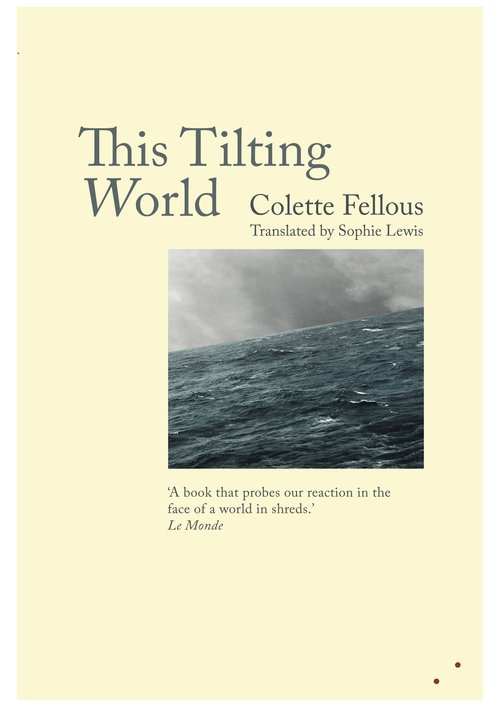Translating Women
INTERNATIONAL | INTERSECTIONAL | ACTIVIST | FEMINIST
Translating Women
INTERNATIONAL | INTERSECTIONAL | ACTIVIST | FEMINIST
Posted by Mark
17 September 2019The latest release from Les Fugitives is a work by French-Tunisian author Colette Fellous, offered in an elegant and articulate translation by Sophie Lewis. In This Tilting World, Fellous explores different dimensions of grief and loss: the sudden death of a friend, the terror attack on the beach at Sousse in 2015, and the exile from a home(land) that both is and is not hers. This is an intimate farewell to parts of Fellous’ life that she loved and can never fully possess or experience again: the recent loss prompts her to reflect on her relationship with her deceased father, and to write a fragmentary novel, a “nocturne” that pays tribute to people she loved, people she never knew, a country that she can never truly leave behind, and a figurative home in literature.

In This Tilting World Fellous draws together her father’s life during the twentieth century, the Tunisia of her childhood, and the changed world of the twenty-first century with its institutionalisation of terror and fear, describing the project within its own pages as an attempt to “tell the story of a father born and dead in the twentieth century, and the story of this world now, this Tunisian village I shall have to leave behind, in this year 2015, a terrifying year, remorseless, in its new, 21st-century colours.” The fragments of text move between past and present, but also beyond rigid notions of time as Fellous blends events and memories from different periods into one narrative experience. She layers terror attacks so that their impact is felt simultaneously, imagines her father as both a deceased adult who has left her adrift and a newborn child who she must protect, and unites her personal experience with a collective or universal one: “my novel is damaged, the world is damaged, I too am deeply wounded.” If her homeland is ravaged so too is she, as her country and her generation witness the birth of “a new kind of warfare, and this terror that is taking root everywhere, even in our own bodies.”
The embodiment of terror – encompassing both fear and exile – is echoed in several of the fragments. Fellous describes the terrorist at Sousse as having killed people “on my beach, our beach, on every beach”, showing a universality of experience (“every beach”) and a collective suffering (“our beach”) alongside her personal grief and loss (“my beach”). Though Fellous recognises that she is privileged to be able to give voice to this experience, she also expresses a desire for individuality (“I don’t want to join any group, I want to see life with my own eyes, I want to be free”) and a yearning for selfhood alongside her reflections on writing, on creativity, and on the ways in which pain can inspire art. This longed-for freedom from prescribed views or distinct communities also represents a freedom from past silence: Fellous attempts to understand her father, and in particular to understand the silence that he transmitted to his children. She acknowledges that with this silence he had hoped to protect them from knowledge of his own suffering, rooted in its historical time of “betrayal, brutality … the camps”, but ultimately the father’s silence imprisons his children in a false innocence, a not-knowing that Fellous seeks to redress through her writing. Her father’s fractured, multi-cultural past is intertwined with historical experiences of colonisation and exile, which represent “the rupture that he’d tried to minimise”: this rupture is woven into the substance of her prose, which is itself always fragmented. Indeed the original title, Pièces détachées, indicates this fragmentation with the rupture between generations, cultures and languages reflected in the ruptures between each shard of text.
Sophie Lewis translates with sensitivity and a depth of understanding of the intricacies of Fellous’ writing: literary references abound but are never heavy-handed; the family experience is understood through references ranging from 19th-century novelist Flaubert to Alain Renais’ holocaust film Night and Fog and many others in between; nouns and adjectives are coupled carefully to convey the wistful heart of the narrative (such as “entwined bodies” or even the title, “this tilting world”, echoed in the text) and the syntax is deliberately poetic (“the wrinkles were become a kind of writing”, “always I stumble at this love”). This book is worth reading for the translation alone: there is a richness and range to Lewis’s vocabulary; the breadth of lexis is stunning, and shows an alertness to the possibilities of language (for example, choosing “I guarded Alain’s smile inside me” over the more obvious equivalent “I kept Alain’s smile inside me”). Above all, Lewis conveys the intimacy of a work that Fellous confesses is at the limits of what she can bear. Fellous claims to be writing so as not to forget her father, to offer him something long promised, and to give him a fitting farewell. Yet it is also a farewell to the country that she means to leave and yet to which she knows she will “always be returning”: she is perpetually drawn back to Tunisia “to see, to reassess, in order more easily to disengage”. This Tilting World is an evocative, candid and deeply moving account of a life lived between histories, worlds and languages, of times gone by, of present horrors and of fears for the future, but above all it is a monument to memory in all its forms: recollection, recognition, and remembrance.
Colette Fellous and Sophie Lewis will be in conversation with Michèle Roberts to launch This Tilting World at Daunt Books Hampstead (London, UK) on Wednesday 18 September; tickets available here.
Review copy of This Tilting World provided by Les Fugitives